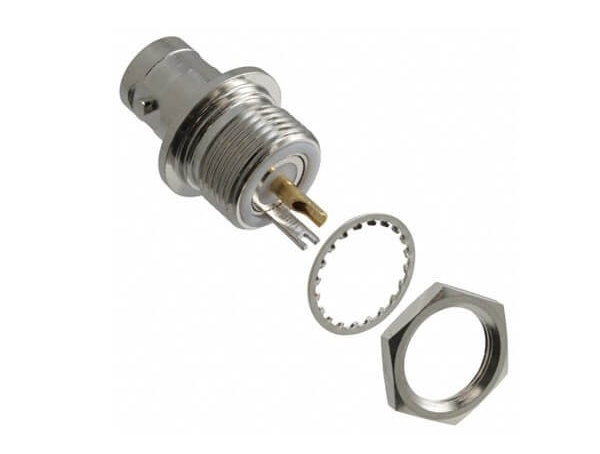Radio frequency connector classification
26/08/2020 2
The radio frequency connector is connected with a coaxial cable, a microstrip line or other radio frequency transmission line to realize the electrical connection and separation of the transmission line or the original part of the transfer of different types of transmission lines. It belongs to a mechatronics product and acts as a bridge.
The model of RF coaxial connector consists of two parts: the main name code and the structure code, separated by a dash "-" in the middle. The main designation code The main designation code of the radio frequency connector adopts the main designation code commonly used in the world, and the naming of different structures of specific products shall be specified by the detailed specifications. Structure code of the structure of the radio frequency connector.

According to the structure of the connection interface:
- Bayonet type (internal bayonet, external bayonet): BNC;
- Thread type (right-hand thread, left-hand thread): L29 (7/16), N, F, TNC, SMA, SMC, SSMA, SSMB, FME, L9 (1.6/5.6), 7mm, 3.5mm, 2.4mm, K (2.92mm), 1.85mm, 1mm;
- Push type (in-line, self-locking): SMB, SSMB, MCX, MMCX, SMP, SMI, BMA, SAA;
- Flange connection type
Classified by size:
- Standard type: UHF, N, 7/16, 7mm;
- Small size: BNC, TNC;
- Subminiature: SMA, SMB, SMC, MCX, BMA, SAA, 3.5mm;
- Micro: SSMA, SSMB, MMCX, 2.4mm, K (2.92mm), 1.85mm, 1mm;
Third, the main specifications of the RF connector
Impedance: Almost all RF connectors and cables are standardized to 50Ω impedance. The only exception is that 75Ω systems are commonly used in cable TV installations. It is also important that the RF coaxial cable connector has the characteristic impedance of the matching cable. If this is not the case, a discontinuity is introduced and loss may result.
VSWR (Voltage Standing Wave Ratio): Ideally, it should be unity, and good design and implementation can keep VSWR below 1.2 within the range of interest.
Frequency range: Now most of the radio frequency work is in the range of 1 to 10GHz, therefore, the connector must have low loss in this area. For the case above 10GHz-there is a lot of work, now things in the 10 to 40GHz range-there are newer connectors among them to choose. They are expensive because of the cable itself.
Insertion loss: This is the connector loss in the frequency range of interest. The loss is usually between 0.1 and 0.3 decibels. Determine how critical per watt (or fractional watt) is in most designs. Even such a small loss must be minimized and included in the link loss budget. It is in the low-noise front end, especially when the signal strength and signal-to-noise ratio are low.
Operation cycle: How many connection/disconnection cycles can be connected and endured and still meet its specifications? This is usually in 500 or 1000 cycles. For threaded connectors, the tightening torque specified by the supplier is an important factor in maintaining performance and reliability.
Power: Power handling is determined by two resistance losses (heating) and insulation breakdown. Although even decades of design are mainly pre-processing tens of watts, today's design community focuses on low-power devices such as mobile phones, picocells and femtocell base stations, video interfaces, RF and gadgets. These are in the sub 1W range, so the connector can be much smaller and its power rating is a smaller constraint.

Due to the development of electronic components, RF coaxial connectors have many good performance. Elecbee.com is a store which sell many kinds of electronic products. Our products have high quality and competitive price and bought from Original OEM Factory in China. More details about RF connectors, please feel free to contact with me.
- Title: Radio frequency connector classification
- Post link: https://www.elecbee.com/blog/en-1639-Radio-frequency-connector-classification
- Category: Industry News RF Connector
- Views: 1,615

